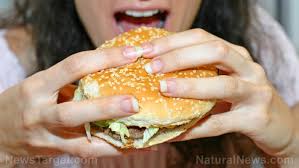
What is the effects of eating to many Calories? It’s unfortunate but in our society people eat to many calories. This causes a lot of problems. More than two out of every three adults in America is overweight or obese, according to the National Health and Nutrition Examination Survey. For some people, this is due to something other than dietary intake, such as hormonal disorders. For everyone else, it’s the result of taking in too many calories from food and not leading an active enough lifestyle. Not only does excess calorie intake pack on the pounds, but eating too many calories from certain sources causes other health problems.
Too Many Calories from Saturated Fat
Eating too many calories in the form of trans fat and saturated fat raises the level of total cholesterol in your blood and, in particular, low-density lipoprotein, or LDL — the harmful form of cholesterol, more so than other dietary components. This matters because elevated levels of LDL are linked to a significantly increased risk of coronary artery disease — the leading cause of death in the United States. CAD occurs when the main artery that supplies blood to your heart becomes hard and narrow from a buildup of cholesterol. Because of their structural characteristics, LDL promotes atherosclerosis more than other types of fat.
Too Many Calories From Carbohydrates
The type of extra calories plays a role in the effects on health. Getting too many calories from refined, processed carbohydrates is common in the U.S. and has its own risk factors. Added sugar is a major source of excess calories as a form of refined carbs in the American diet. The effect of added sugar intake on insulin sensitivity is still debated. However, taking in too many calories from refined carbohydrates is thought to increase the risk of insulin resistance. Reducing added sugar intake significantly improves insulin resistance, according to a study of Latin adolescents in Los Angeles.
TIPS FOR HIGH TO BURN CALORIES AND FAT
Counting calories is not just a matter of what we eat, but how much we burn, too.
1. Eat breakfast: A protein and healthy fat breakfast can keep you full for longer and help prevent snacking during the day.
2. Eat regular meals: This can help you burn calories more effectively and helps prevent mindless snacking.
3. Remember your “five-a-day:” Fruits and vegetables can be a tasty snack and they can bulk out your meals. They are high in nutrients and fiber and low in calories and fat.
4. Eat slow-burning calories: High-fiber carbohydrates, such as legumes, and healthy fats, such as avocado, take longer to release energy, so you will not get hungry as quickly.
5. Exercise: This can help burn off extra calories, and it can make you feel good. A brisk daily walk is easy for most people to do and costs nothing. Challenge yourself with a pedometer. For people who use a wheelchair, there are exercises that can boost heart health and strength.
6. Drink water: It is healthful, has no calories, and can fill you up. Avoid alcohol and sodas as these can easily provide far too many calories. If you crave sweet drinks, choose unsweetened fruit juices, or better still, get a juice maker.
7. Eat more fiber: Fiber, found in fruits, vegetables, and wholegrains, can help you feel full and encourage healthy digestion.
8. Check the label: Some items have hidden fats or sugars. “Ten percent less fat,” might not actually mean very much less fat, and it does not necessarily mean that you can eat more of it or that it is really more healthful. If you are counting calories, the label will help you keep track.
9. Use smaller plates: Research indicates that portion sizes have increased over the last 3 decades, and this may contribute to obesity. Using a smaller plate encourages smaller portions.
10. Slow down: Eat slowly and rest between courses or extra servings, as it can take 20 to 30 minutes for your body to realize it feels full.
11. Make a shopping list: Plan a week of healthful meals and snacks, list the ingredients you need, and when you go grocery shopping, stick to it.
12. A little of what you fancy: Banning foods can lead to cravings and bingeing. Spoil yourself occasionally with a favorite treat, but in smaller amounts.
13. Get enough sleep: Sleep loss affects the metabolism, and it has been linked to weight gain.
14. Avoid eating 2 hours before bed: Eating within 2 hours of sleeping can interfere with sleep quality and promote weight gain.
